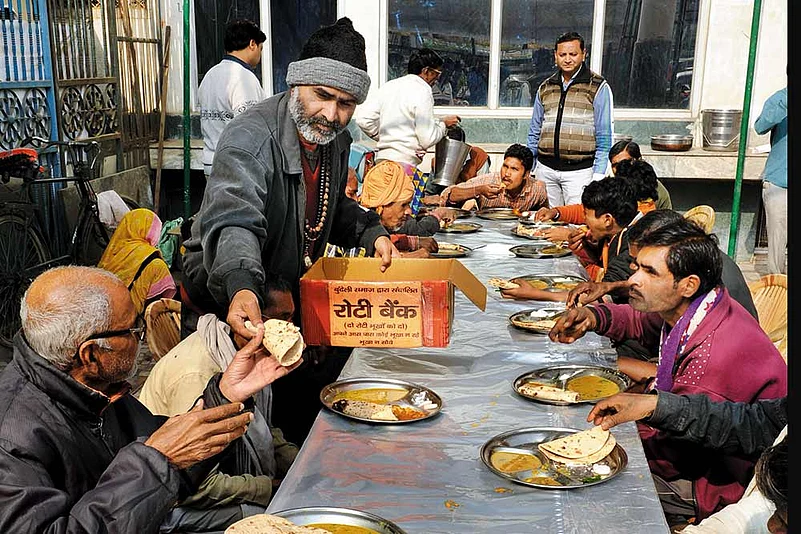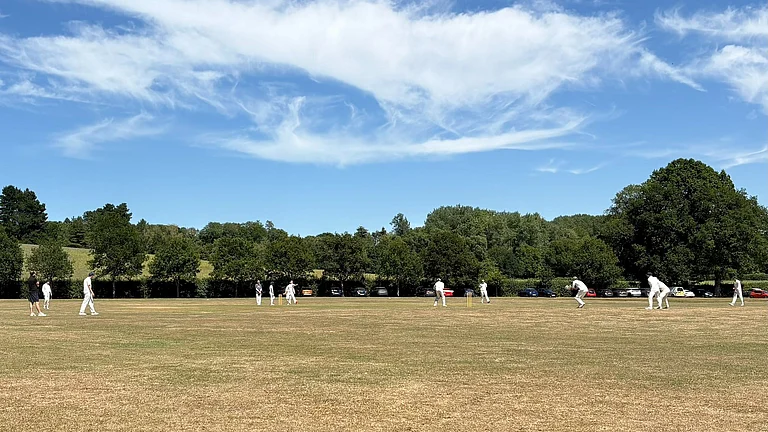At Aalha-Udal Chowk in Mahoba, hoardings welcome politicians and advertise jaagran shivirs (spiritual awakening camps). There is a sit-in too at the chowk—named after two warrior brothers of the region’s folklore—for a separate Bundelkhand state, which has clocked 536 days. About 10 people are sitting under the banner of Bundeli Samaj; Jai Bundelkhand is their preferred salutation. The Bundelkhand region comprises over a dozen districts, including Mahoba, in Uttar Pradesh and Madhya Pradesh.
Among the demonstrators is 49-year-old Tara Patkar, the convener of Bundeli Samaj. Bearded, barefoot and wearing a rosary with a portrait of Osho, Patkar’s appearance is striking. A journalist for over 20 years in Lucknow, he quit his job in 2015, returned to his native place, Mahoba, and resolved to walk barefoot until the district gets a medical college. “In Lucknow, there are many people to fight for the cause, but there are a few here,” says Patkar. A separate state will bring the government’s attention to the region that, he feels, has been ignored so far. Big mining companies are plundering Bundelkhand for gravel and sand, he claims, and the region lacks healthcare facilities. The demand for a separate state has been there for almost 30 years, he adds.
The former scribe made news himself barely a month after he moved to Mahoba. In April 2015, he and four of his associates started an initiative called Roti Bank. “Bundelkhand is infamous for hunger and starvation. We decided that nobody should go to sleep on an empty stomach,” says Patkar. He went around town distributing rotis and vegetables to those in need.
“People extended support readily. Young boys joined as volunteers and started doing deliveries. Some wanted to give money, but we refused and told them we only accept food,” says Patkar. However, they had a surplus on most days and eventually refused food donations as well. The leftovers were fed to cows. Some concerns arose about plastic packaging and difficulty in distributing watery preparations of vegetables or dal. So they stuck to dry dishes and rolled them between rotis, which were then wrapped in paper.
Once the initiative became well-known, they decided to change their operating style. Instead of going from place to place to distribute food, they installed ‘food boxes’ at 21 prominent spots in town, where they kept food packets. “An interesting change happened—the number of beggars went down significantly,” says Patkar. “If any beggar asked for alms, people would redirect them to the food boxes.” Over the years, the number of boxes reduced to two; these still function. Patkar says Roti Bank caught people’s attention and similar initiatives took root in other places.
Ajay Barsaiyan, who has been associated with Patkar since the inception of Roti Bank, says that some people criticised the initiative, alleging that it encouraged laziness. He disagrees though. “At times, rickshaw-pullers come to take the packets. I once asked one why he, an able-bodied person, needed it. He said that if he ate this, he would be able to give a little extra to his family. His words filled me with guilt,” says Barsaiyan. “It’s mostly the elderly who take it as the young do not come out of shame. We also discourage drug addicts. If we give them free food, they will never reform.”
Patkar is a bachelor and lives in a joint family. His father’s business helps him sustain himself. An avid follower of Osho, he believes that one should strive to develop their wujood (inner self). Barsaiyan has pointed observations about his associate: “Patkar walks barefoot, is slightly eccentric and can be obsessive—if he decides something, he’ll stick to the decision no matter what.”
Also Read:
By Salik Ahmad in Mahoba


























